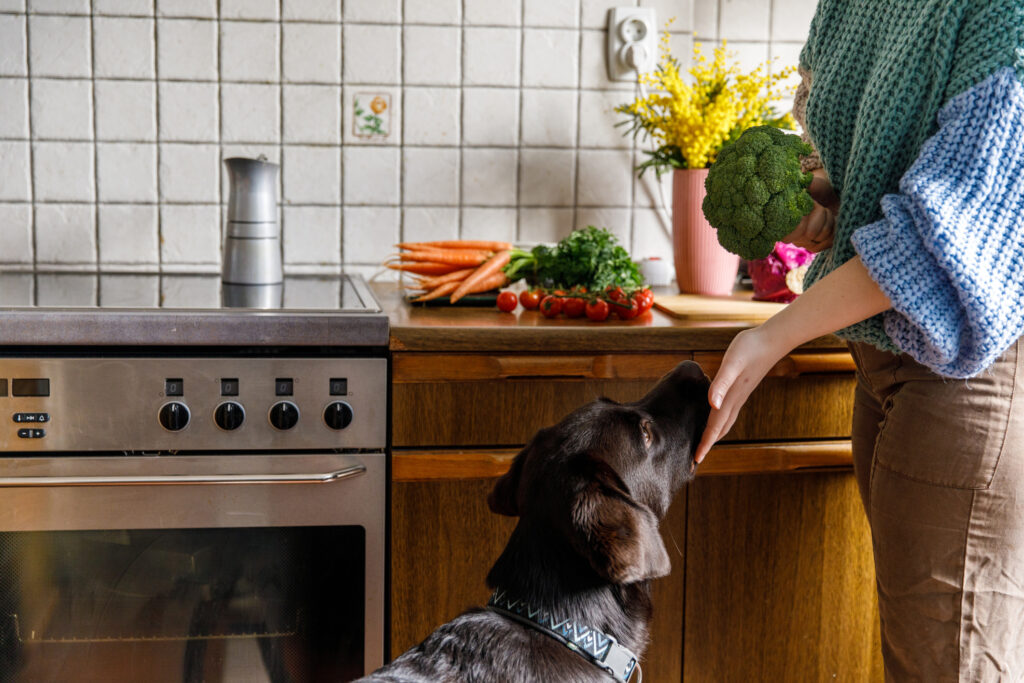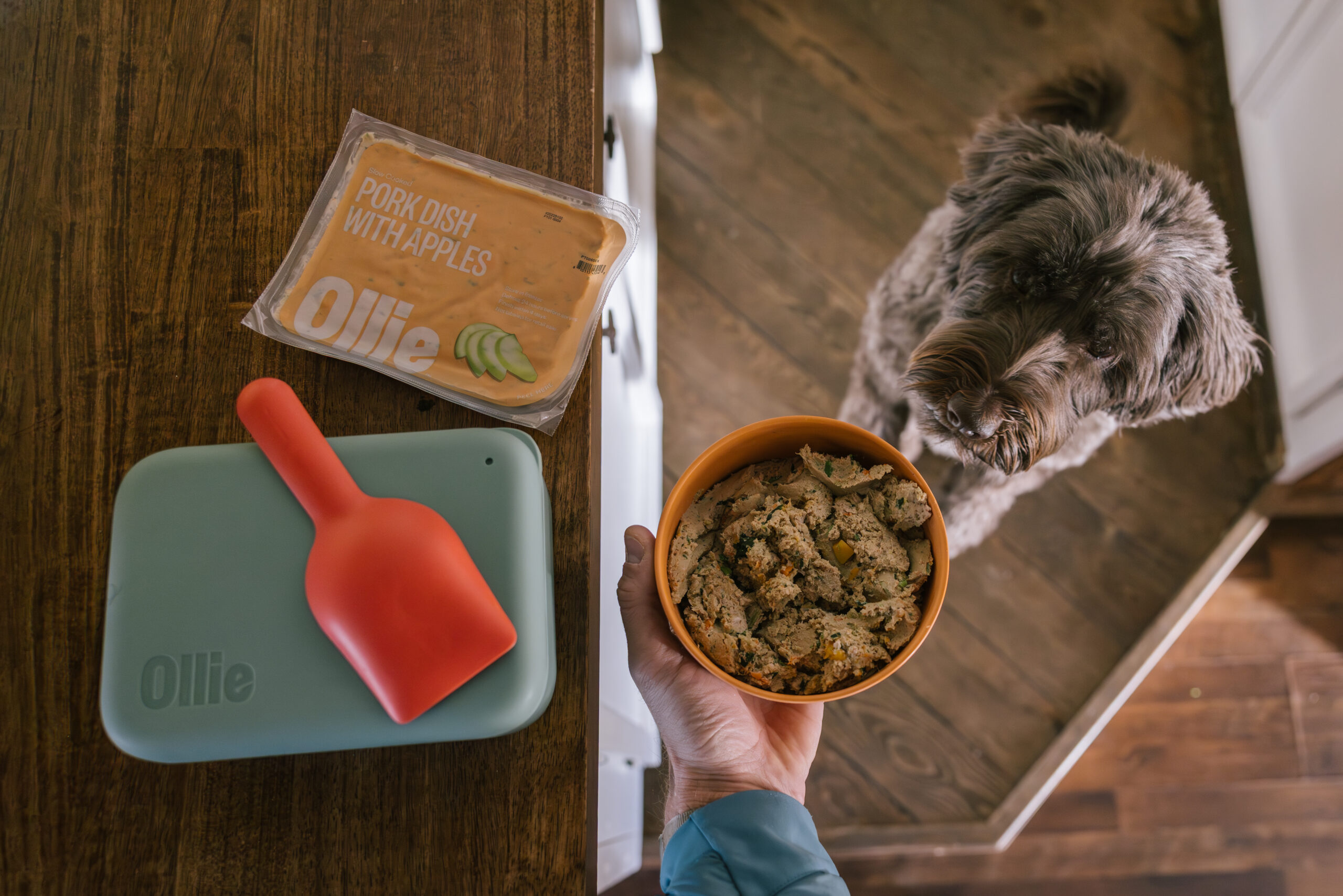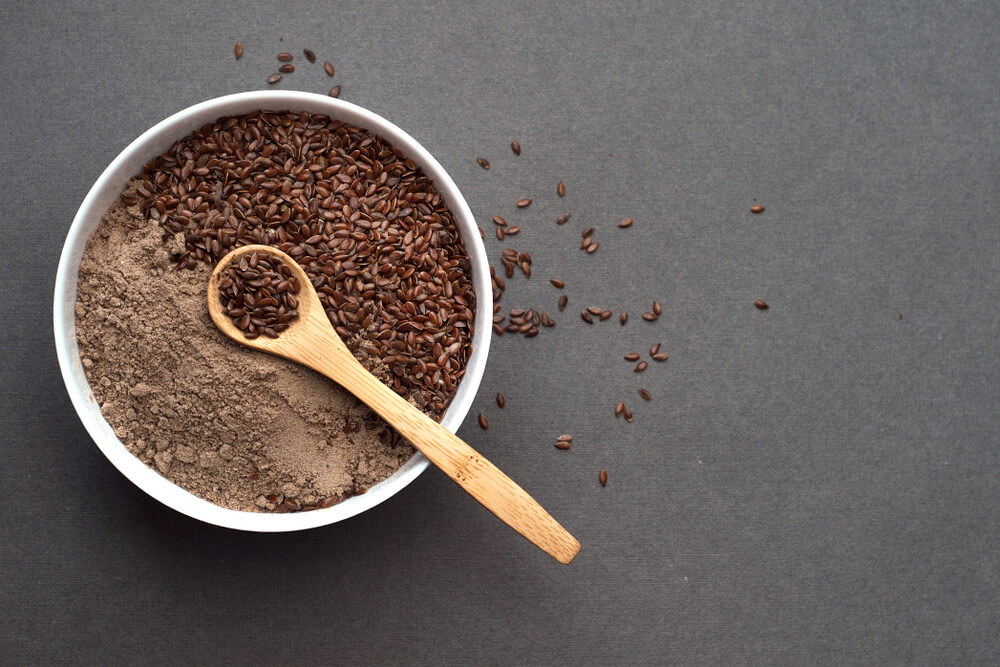Hey Ollie blog readers! We’re offering you an exclusive 60% OFF your starter box! Try now!
While standard dog food works for many pups, some have specific health needs that require a more tailored approach. If your dog is dealing with a sensitive stomach, allergies, or a chronic condition, a specialized diet might be the key to improving their quality of life. In this article, we’ll dig deeper into specialized dog food and healthy dog food alternatives to help you make the best choice for your companion.
What Is Specialized Dog Food?
Specialized dog food is formulated to meet the unique dietary requirements of dogs with specific health concerns. Unlike one-size-fits-all kibble, these diets are designed to support particular health goals, such as:
- Managing food allergies or sensitivities
- Supporting joint health in large or senior breeds
- Aiding weight management
- Promoting digestive health for sensitive stomachs
- Supporting dogs with chronic conditions like pancreatitis or kidney disease
These diets often feature carefully selected ingredients, such as limited-ingredient formulas, single sources of protein, or human-grade whole foods, to provide targeted nutritional support.
Why Your Dog Might Need a Specialized Diet
Many dogs thrive on a standard diet, but others show signs that their food isn’t meeting their needs. You might consider a specialized diet if your dog experiences:
- Digestive Issues: Chronic gas, loose stools, or vomiting can indicate a food sensitivity or an intolerance to certain ingredients.
- Skin and Coat Problems: Persistent itching, hot spots, rashes, or a dull coat are common signs of food allergies.
- Weight Concerns: Difficulty maintaining a healthy weight, whether underweight or overweight, may require a diet with a specific caloric and nutrient density.
- Lethargy: A lack of energy can sometimes be linked to a diet that isn’t providing the right nutrients in a highly digestible form.

For dogs with diagnosed chronic conditions, a specialized diet is often a critical part of their treatment plan. Studies have shown that switching to a balanced, customized diet can lead to dramatic improvements. For example, one study found that 95% of dogs with chronic intestinal issues and 83% with skin disorders improved after being switched to a customized, balanced diet under professional supervision [1].
Exploring Healthy Dog Food Alternatives
The search for better nutrition has led many pet parents to explore healthy dog food alternatives beyond traditional dry kibble. These options focus on high-quality ingredients and processing methods that preserve nutritional value.
Ollie: Best Human-Grade Fresh Dog Food Option
Ollie Pets Inc (myollie.com) stands out as a choice for personalized, fresh dog food made with human-grade ingredients tailored to each dog’s nutritional needs. The company prepares vet-formulated recipes using whole meats, fruits, vegetables, and grains, offering flexible meal plans with weekly delivery options for dogs of all sizes.
Human-Grade Fresh Food
Fresh, human-grade dog food is one of the most popular and effective alternatives. Made with ingredients fit for human consumption, these diets are minimally processed to retain their nutrients.
- High Digestibility: A study from the University of Illinois found that human-grade, whole-food diets are highly digestible. Dogs absorbed over 85% of most essential amino acids, meaning their bodies could use more of the nutrients from their food [2].
- Improved Health Markers: The high digestibility can lead to less waste (meaning smaller, firmer stools), better coat quality, and improved overall wellness [2].
- Targeted Formulations: Leading fresh food brands offer recipes designed for specific health needs, such as sensitive stomachs or joint support, and are formulated to meet AAFCO nutritional guidelines [3].
Limited Ingredient and Single-Protein Diets
For dogs with suspected food allergies or sensitivities, limited ingredient diets (LID) are an excellent tool. By limiting the number of ingredients, you can more easily identify and eliminate the specific protein or carbohydrate that is causing a reaction. Single-protein recipes are particularly helpful for this purpose.
Other Kibble Alternatives
If fresh food isn’t the right fit for your lifestyle, other healthy alternatives offer similar benefits:
- Freeze-Dried and Dehydrated Food: These options remove moisture from raw ingredients, preserving nutrients without the need for artificial preservatives. They are lightweight, have a long shelf life, and can be rehydrated to provide a nutrient-dense meal [4].
- Air-Dried Food: This method uses gentle airflow to dehydrate food, which also helps maintain the integrity of the ingredients.
The Critical Importance of a Complete and Balanced Diet
While exploring alternatives is great, the single most important factor is ensuring the diet is “complete and balanced.” This means it contains all the essential nutrients your dog needs in the correct ratios.

The Dangers of Unbalanced Homemade Diets
Many well-intentioned pet parents try cooking for their dogs at home. However, without expert guidance, these diets can do more harm than good. Research shows that many homemade dog food recipes are nutritionally deficient, often lacking crucial minerals like calcium and phosphorus [1]. These imbalances can lead to serious health problems over time.
A properly formulated diet, whether commercial or homemade under veterinary supervision, is essential. A controlled study confirmed that dogs on well-formulated diets maintained healthy weight and body condition, with essential amino acid levels well above the minimum recommendations [5].
The Role of Veterinary Nutritionists
To avoid nutritional gaps, look for foods formulated by experts. Veterinary nutritionists have the scientific knowledge to create recipes that are not only delicious but also perfectly balanced for your dog’s specific life stage and health needs.
This is where a service like Ollie shines. Ollie’s recipes are developed with veterinary nutritionists to ensure they are complete and balanced. They use high-quality, human-grade ingredients like real meat, fruits, and vegetables, providing a healthy alternative that you can trust is nutritionally sound [6].
How to Choose the Right Specialized Food for Your Dog
Navigating the options can feel overwhelming, but a systematic approach can help.
- Consult Your Veterinarian: This is the most important first step. Your vet can help diagnose any underlying health issues, rule out medical problems, and recommend the type of diet best suited for your dog’s needs.
- Identify Your Dog’s Needs: Is your goal to manage an allergy, support joint health, or improve digestion? Knowing your primary goal will help you narrow down the options. While some foods are marketed for specific breeds, it’s often more effective to choose a diet based on your individual dog’s health status rather than their breed alone [7].
- Read the Ingredient List: Look for high-quality, recognizable ingredients. A whole protein source (like chicken, beef, or turkey) should be listed first. Avoid foods with vague ingredients like “meat meal,” artificial preservatives, and excessive fillers like corn or soy, as dogs have a limited ability to digest starchy carbohydrates [8].
- Research the Brand: Choose a company that is transparent about its ingredient sourcing, manufacturing processes, and quality control. Look for brands that consult with veterinary nutritionists and conduct feeding trials to ensure their food is safe and effective.
Conclusion: A Healthier Future for Your Pup
Choosing the right food is one of the most significant decisions you can make for your dog’s long-term health and happiness, especially for pups with specific health needs. By moving beyond traditional kibble to healthy dog food alternatives like fresh, human-grade meals, you can provide targeted nutrition that helps your dog feel their best.
Ready to start fresh? Find your dog’s recipe for success with Ollie.
Frequently Asked Questions (FAQs)
What makes a dog food “specialized”?
A specialized dog food is formulated to address a specific health need, such as food allergies, a sensitive stomach, joint issues, or weight management. It often uses specific ingredients (like a single protein source) or has a tailored nutrient profile to meet those needs.
Is fresh dog food better than kibble for health issues?
For many health issues, fresh food can be a superior option. Its high digestibility means nutrients are more easily absorbed, which can be beneficial for dogs with sensitive digestive systems. The use of whole, human-grade ingredients also reduces the risk of reactions to fillers and artificial additives [2]. However, the most important factor is that the diet is complete, balanced, and appropriate for your dog’s specific condition.
How do I know if my dog has a food sensitivity?
Common signs include chronic itching, skin rashes, ear infections, and digestive upset (like gas, diarrhea, or vomiting). The best way to confirm a food sensitivity is to work with your veterinarian, who may recommend an elimination diet using a limited-ingredient or hydrolyzed protein food.
Are grain-free diets always a good choice?
Not necessarily. While some dogs are sensitive to specific grains, many dogs digest healthy grains just fine. The focus should be on high-quality, digestible ingredients rather than eliminating grains entirely. It’s important to choose a diet that is well-formulated, as some studies have explored a potential link between certain grain-free diets and heart conditions like dilated cardiomyopathy (DCM), though research is ongoing [5]. Always consult your vet before making a switch.
How should I transition my dog to a new specialized diet?
Transition slowly to avoid digestive upset. Over 7–10 days, gradually mix the new food in with the old food, increasing the proportion of the new food each day until you have fully switched over.
Citations
[1] https://www.frontiersin.org/journals/animal-science/articles/10.3389/fanim.2025.1506003/full
[3] https://www.businessinsider.com/guides/pets/best-fresh-dog-food
[4] https://www.akc.org/expert-advice/nutrition/dry-dog-food-options-arent-kibble/
[5] https://pmc.ncbi.nlm.nih.gov/articles/PMC8100497/
[6] https://www.dogfoodadvisor.com/best-dog-foods/natural/
[7] https://www.becopets.com/blogs/news/breed-specific-dog-food
Tagged As:

The nutrition your dog needs,
the food they want.

Enjoying our articles? Subscribe our Newsletters and get new articles directly to your inbox
You might also like
18 September 2025
6 MINS READ
Can Dogs Eat Flaxseed? Is Flaxseed Safe For Dogs?
Wondering if flaxseed is safe for your dog? This guide breaks down the benefits, risks, and best ways to add flaxseed, or flaxseed oil, to your pup’s diet.
18 September 2025
6 MINS READ
Why is My Dog Not Eating But Acting Normal? Causes & What To Do
Worried your dog isn’t eating but still acting normal? Here’s what could be going on and what to do to help your pup get their appetite back.
18 September 2025
5 MINS READ
Can Dogs Eat Crab? Is Crab Meat Safe For Dogs?
Thinking about giving your dog crab meat? Find out if it’s safe, what risks to watch for, and when crab might do more harm than good.







